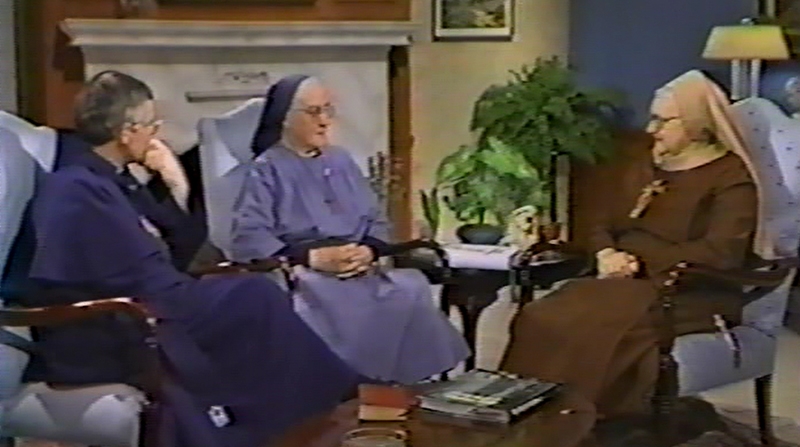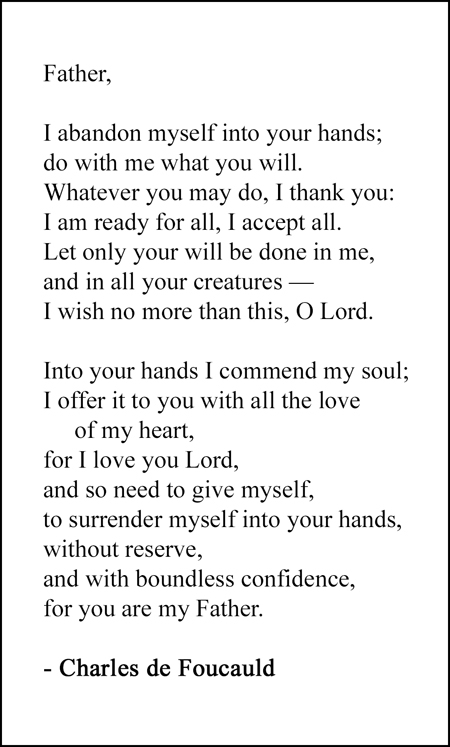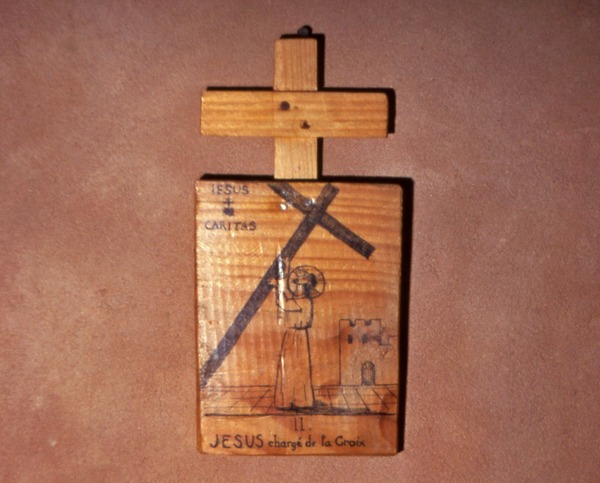Abandonment Prayer
The Abandonment Prayer has become one of the better known aspects of Charles’ spirituality. It is derived from a meditation Charles composed on the death of Jesus on the Cross:
Father,
I abandon myself into your hands;
do with me what you will.
Whatever you may do, I thank you:
I am ready for all, I accept all.
Let only your will be done in me,
and in all your creatures—
I wish no more than this, O Lord.
Into your hands I commend my soul;
I offer it to you with all the love of my heart,
for I love you Lord, and so need to give myself,
to surrender myself into your hands,
without reserve,
and with boundless confidence,
for you are my Father.
We, the Little Sisters of Jesus and Mary, recite this prayer every morning at the beginning of our day.
We recommend this prayer to everyone who desires to love God with greater intimacy and trust. To abandon ourselves to God’s will is the only sure road to peace of mind.
Our Founder on the Abandonment Prayer

In 1987, Sr. Mary Elizabeth was interviewed on the Eternal Word Television Network (EWTN). She had this to say about the Abandonment Prayer:
“The first prayer we say every day is the Abandonment Prayer of Brother Charles, which is a very beautiful prayer in which we give ourselves totally to God.”
Question: What does abandonment mean?
“Abandonment simply means that you give yourself completely to God in such a way that you trust Him with everything that He has in mind for you, and that each morning you just give yourself to Him completely and you’re at ease and at rest because you know that He is going to take care of you. He’s not going to do it maybe your way but He’s going to do it His way, which is a lot better.”
Question: What are some of the difficulties in abandoning oneself?
“Well, sometimes you’re a little afraid of what is He going to want to do. You don’t always feel like you’re ready for it, but that’s what takes faith, it just takes faith. We like to make our own plans. . . . I can assure you there are many times when I thought that I could not go on with some of the things that I had to bear. It’s just trust.
“And if you can trust, God will certainly take care of this matter, but give yourself to Him. That’s what we mean by abandonment. It’s when you don’t believe, believe anyhow.
“Faith is believing when you don’t believe. When you do believe it’s easy—it’s when you don’t believe that you have to have faith, and when you can’t see any way out that you have to have hope.”

How the Prayer that We Know Came to Be
We found this information online from Lsr. Kathleen, author of The Universal Brother: Charles de Foucauld Speaks to Us Today.
In an article she wrote (we don’t have the web address), she presents the recollection of one of the original novices of the Little Sisters of Jesus. Lsr. Magdeleine Hutin, founder of the community, wanted to give the novices a prayer that would help them grow in the spirit of Br. Charles:
“One evening, Lsr. Magdeleine called Lsr. Anne and me. She read us a meditation written by Br. Charles on the line from the Gospel, ‘Father, into your hands I commend my soul.’ She asked, ‘Don’t you think that would be a nice prayer to say each day?’ We were in complete agreement, but it couldn’t be recited as he wrote it because his meditation was so full of repetitions. We read and re-read it, removing much of the repetition and trying to keep the key elements. And that night the prayer that we, together with so many others, now say each evening was born.”
Here is more about the origin of the prayer from Lsr. Kathleen:
“Abandonment” was the first entry in Lsr. Magdeleine’s notebook of quotes from Br. Charles: ‘It’s the final prayer of our Master, our beloved… May it also be ours… May it not just be the prayer of our final moment, but of every moment…’
“There followed the entire meditation, written while Br. Charles was a Trappist in Syria in 1896. He had been entrusted with two postulants and had begun writing meditations to help them focus on Jesus’ words and examples. Rene Bazin had included the passage in his first anthology of Charles de Foucauld’s writings, and that’s where Lsr. Magdeleine had found it. With her first novices they whittled it down to the prayer that is so well known today.”
Note: the aforementioned book by Lsr. Kathleen has a longer discussion about the prayer.
The Source Text of the Prayer
Here is the original meditation written by Br. Charles that was edited by Lsr. Magdeleine and her first novices to become the Abandonment Prayer:
“My Father, I surrender myself into your hands; my Father, I entrust myself to you; my Father, I abandon myself to you; my Father, do with me what you will; whatever you may do with me, I thank you; thank you for all; I am ready for all, I accept all; I thank you for all; let only your will be done in me, my God, let only your will be done in all your creatures, in all your children, in all those that your heart loves, I wish no more than this my God; I commend my soul into your hands; I offer it to you my God with all the love of my heart because I love you and it is a need of love to give myself, to surrender myself into your hands without measure; I entrust myself into your hands with infinite confidence, for you are my Father.”

Understanding the Prayer from Charles’ Perspective
The following is from Lsr. Cathy Wright, author of Saint Charles de Foucauld: His Life and Spirituality.
“The Prayer of Abandon has been used in many contexts. To understand it from Charles’ perspective you have to know that his prayer style was very Jesus-centered, the fruit of a deep personal relationship with Jesus. There was nothing abstract about his prayer. He often dialogued with Jesus (today we would call it active imagination) and he wrote many of these conversations down as a way of helping him to focus his prayer, especially in times of dryness.
“The Prayer of Abandon was not written as a spiritual testament at the end of Charles’ life. In fact, he wrote it in the early years as a Trappist. The well-known text is actually taken from a longer meditation, a prayer that Charles puts onto the lips of a dying, crucified Jesus. That is important to know. And as with most of our prayers and meditations, it reveals more about Charles’ own relationship with God than that of Jesus. As it was never meant to be read by others, it paints a very intimate portrait. . . .
“The Prayer of Abandon is the prayer of the Cross. Jesus is no longer praying for the cup to pass nor even for the strength to drink this cup. That was yesterday and so many things have happened in between. Jesus is dying now and there is no escape.
“The only choice that is left at this hour is that of how Jesus will live his death. What will be his attitude? He can revolt in the face of the injustice of it, for it is unjust. He can be embittered by the jeers and mocking. He can turn to hardened resignation – but Jesus chooses to live this moment with a love that is really hard for us to grasp or imagine. . . .
“Charles does not refer explicitly to the ‘Prayer of Abandon’ throughout his life. But from his other writings and what we know of his life it seems to have expressed his basic attitude towards God, one that saw him through the ups and downs and struggles – and ultimately, in the face of his own violent death. It was a school of life as well as of death.”
A Family Member’s Perspective
Anne de Blic, the great-granddaughter of Charles’ sister Marie, had this to say about the prayer:
“I feel like I was born talking about Charles de Foucauld. . . One can feel a mixture of admiration with the awareness of having an incredible chance to be related to such a man. But there’s also the temptation to wonder if you’re going to live up to it. . . which is a dead end. Everyone is who they are.
“For me, his prayer of abandonment is extraordinary. It goes very far on a spiritual and psychological level. When one is caught by a wave in the Atlantic Ocean, the ‘normal’ reaction is to fight against the current. But this is exhausting and you drown. On the contrary, if you let go, the current will bring you further to the shore. This is the symbol of trust and abandonment in the Faith, which Charles de Foucauld lived: not to panic in an ordeal, but to trust.”
Source: “Relatives of future saint to attend his May 15 canonization,” aleteia.org
